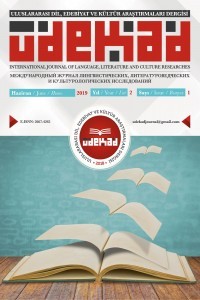REBECCA WEST'İN ASKERİN DÖNÜŞÜ ROMANINDA SAVAŞ TRAVMASI
Bu makale özellikle yirminci yüzyıl savaşı travmasının ulus fikrini oluşturan ve öğreten üst anlatıları nasıl sorguladığını ve Rebecca West’in Askerin Dönüşü (1918) adlı eserinde bireyleri bu ideolojiyle nasıl ilişkilendirdiğini tartışmayı amaçlamaktadır. Roman, savaş travmasının neden olduğu farklı rahatsızlık düzeylerini başarılı bir şekilde tasvir etmektedir; bunlardan biri, Chris'in güvenli olmayan bir dünyada bir tür bağdaşım bulmak için karısını hatırlamayı reddetmesidir. Romanda, şoka uğramış Chris'in travması çarpıcı bir şekilde psikolojik kriz durumlarında kadın öznelliğinin anlatısal keşfine yol açar. Aslında hikaye, savaşın hem erkekler hem de kadınlar üzerindeki etkilerini araştırırken, savaş cephesinde ve ev cephesinde hayatta kalmak arasında birçok benzerlik olduğunu öne sürmektedir. Romanda, Chris'in savaş travması, romanın diğer ana karakterlerini, Viktorya toplumu tarafından oluşturulmuş sosyal ve toplumsal cinsiyet rollerini sorgulamaya zorlayarak, onları kurumsal sistemlerin doğasını, toplumsal cinsiyet çatışmasıyla ilgili olarak yeniden değerlendirmeye zorlamaktadır; böylece, Askerin Dönüşü, erkek ve kadın travmalarını daha muammalı bir bağlantıda başarıyla bir araya getirmektedir.
Anahtar Kelimeler:
savaş romanı, şarapnel-şoku, Rebecca West, Askerin Dönüşü, savaş travması
TRAUMA OF WAR IN REBECCA WEST’S THE RETURN OF THE SOLDIER
This paper aims particularly at discussing how the trauma of twentieth-century warfare challenge the metanarratives that construct and instruct the idea of nation, and how trauma connects individuals with this ideology in Rebecca West’s The Return of the Soldier (1918). The novel successfully portrays different levels of disturbances caused by the trauma of war one of which is Chris’ rejection of recalling his wife to find a kind of internal unity in an unsafe world. In the novel, shell-shocked Chris’ trauma strikingly leads to the narrative exploration of female subjectivity in states of psychological crisis. The story suggests many similarities between surviving at the battlefront and homefront while exploring the effects of war on men as well as women. In the novel, Chris’s war trauma makes other major characters of the novel question their social and gender roles framed by the Edwardian society compelling them to re-evaluate the nature of institutional systems in relation to gender conflict; thus, The Return of the Soldier successfully places men’s and women’s traumas in conjunction with one another in a more puzzling connection.
Keywords:
war novel, shell-shock, Rebecca West, The Return of the Soldier, war trauma,
___
- Bergonzi, Bernard (1965). Heroes’ Twilight. London: Constable.
- Hynes, Samuel (1968). The Edwardian Turn of Mind. Princeton: Princeton University Press.
- Hynes, Samuel (1990). A War Imagined: The First World War and English Culture. London: Bodley Head.
- Hynes, Samuel (1998). “Introduction”. The Return of the Soldier. Rebecca West. New York: Penguin. vii-vxi.
- Leed, Eric J. (1979). No Man’s Land: Combat and Identity in World War I. Cambridge: Cambridge UP.
- Orel, Harold (1986). The Literary Achievement of Rebecca West. London: Macmillan.
- Pulsifer, Rebecah (2013). “Reading Kitty’s Trauma in Rebecca West’s The Return of the Soldier”, Studies in the Novel, 45:1 (2013), 37-55.
- Raitt, Suzanne and Trudi Tate (1997). “Introduction”. Women’s Fiction and the Great War. Eds. Raitt and Tate. Oxford: Clarendon. 1-17.
- Showalter, Elaine (1987). The Female Malady. Middlesex: Penguin.
- West, Rebecca (1989). The Return of the Soldier. London: Virago.
- Başlangıç: 2018
- Yayıncı: Reşat ŞAKAR
